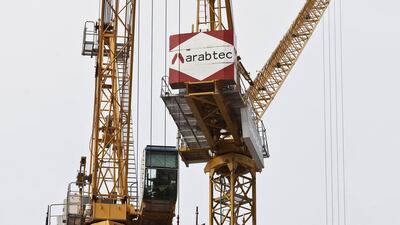Dubai’s benchmark stock index dropped and Abu Dhabi’s was flat in the first day of trading after MSCI announced which UAE companies would be included in its emerging market index.
But in the long term, asset managers expect that investors will reap benefits as foreign investment boosts trading volumes and companies warm to the idea of selling shares to the public.
The benchmark Dubai Financial Market General Index dropped 2.6 per cent yesterday.
Two of the stocks selected by MSCI, the developer Emaar and Dubai Islamic Bank, led Dubai's decliners yesterday, both falling by about 4 per cent.
Besides Emaar and Dubai Islamic Bank, the stocks joining the MSCI Emerging Markets Index are: Aldar, DP World, Abu Dhabi Commercial Bank, National Bank of Abu Dhabi, Arabtec, FGB and Dubai Financial Market.
“UAE markets have been aware of the MSCI upgrade for nearly a year now, so a lot of the news is priced in,” said Simon Kitchen, a Cairo-based strategist at the Egyptian investment bank EFG-Hermes. “Plus, the market is now focusing more closely on how much money will come into the market with the upgrade, rather than just assuming a multi-billion-dollar inflow.
“In the long run, the MSCI upgrade will help to develop the UAE markets – institutional investor interest will make capital raising through IPOs easier and it may support improvements in corporate governance.”
MSCI’s picks, mostly banks and financial service companies, will come as no surprise as these stocks are among the most liquid, largest and most open to foreign investment. Investors often like to buy into banks as proxies for the wider economy. And in the UAE that is even more of a popular strategy given that few hydrocarbon related companies, the engine of most of the economy, are publicly traded.
Since the announcement last June that the Emirates would join the emerging-markets index, which has more than 800 listed companies in 21 markets across the developing world, UAE stocks have rallied in anticipation.
The rich valuations that resulted could make some fund managers cautious of being overexposed to UAE assets.
Still, about US$1 billion will flow into UAE stock markets from foreign index trackers alone as a result of the upgrade, according to HSBC.
“The most significant potential benefits of reclassifications include an increase in portfolio flows with the entry of foreign institutional investors and passive or index-tracking investors,” said Salah Shamma, a regional asset manager at Franklin Templeton. “We believe the positive liquidity boost following MSCI’s decision coupled with attractive valuations will support the GCC markets over the medium term. The economic outlook – at least in the majority of GCC countries – remains positive.”
mkassem@thenational.ae
Follow us on Twitter @Ind_Insights

